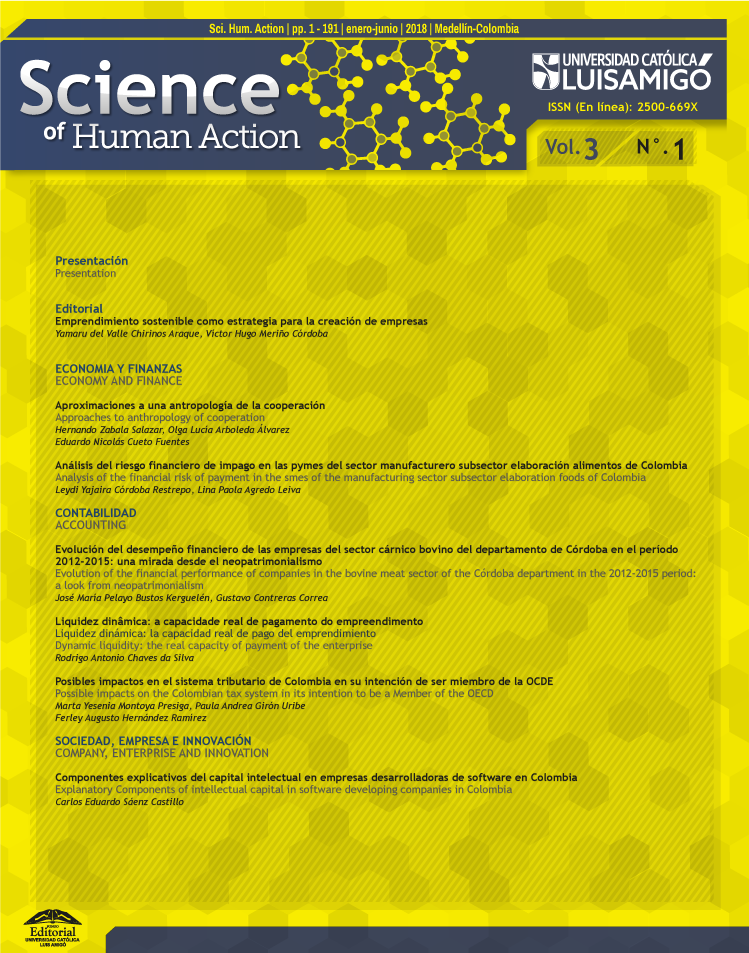Possible impacts on the Colombian tax system in its intention to be a member of the OCDE
DOI:
https://doi.org/10.21501/2500-669X.2713Keywords:
OECD, double taxation agreements, tax information exchange, permanent establishment, BEPS.Abstract
Colombia's desire to be a member of the Organization for Economic Co-operation and Development (OECD) has been carried out, and it has several implications in the tax matter process. For this purpose, a biographic research on the changes made in Colombia’s legislation was implemented by facing the recommendations of the OECD and the approach that will be given to the taxation in Colombia based on those variations. The substantial changes are addressed to the subscription of CDI according to the OECD’s model; the agreement for the exchange of information with other countries; BEPS’ actions; the transfer pricing regime; in addition to the recommendations of the committee of experts for equity and tax competitiveness to achieve a fair and equitable tax structure.Downloads
References
Comisión de Expertos para la Equidad y Competitividad Tributaria. (2015). Informe Final Comision de Expertos para la Equidad y Competitividad Tributaria. Recuperado de https://comisionreformatributaria.files.wordpress.com/2015/03/informe-final-de-la-comisiocc81n-versiocc81n-final2.pdf.
Congreso de la República de Colombia. (junio 16 de 2011). Ley 1450 de 2011, Plan Nacional de Desarrollo 2010-2014. Recuperado de http://www.secretariasenado.gov.co/senado/basedoc/ley_1450_2011.html.
Consejo de Estado. (2010). Conferencia interpretación Tratados para evitar la doble imposición. Recuperado de http://www.latindadd.org/wp-content/uploads/2016/11/ACUERDOS_PARA_EVITAR_LA_DOBLE_TRIBUTACIO.pdf
Corte Constitucional República de Colombia. (2013). Recuperado de http://www.corteconstitucional.gov.co/relatoria/2003/c-690-03.htm
Corte Constitucional República de Colombia. (2016). Sentencia C-417/12. Recuperado de http://www.corteconstitucional.gov.co/relatoria/2012/C-417-12.htm.
Dirección de Impuestos y Aduanas Nacionales de Colombia (DIAN). (2015). Precios de transferencia para todos. Recuperado de www.incp.org.co/procedimiento-para-la-presentacion-de-la-declaracion-informativa-de-precios-de-transferencia-es-una-opcion/
Organización para la Cooperación y el Desarrollo Económicos (OCDE). (2010). Modelo de Convenio Tributario sobre el impuesto de renta. Recuperado de http://www.oecdbookshop.org/browse.asp?pid=title-detail&lang=en&ds=Modelo-de-Convenio-Tributario-sobre-la-Renta-y-sobre-el-Patrimonio-versi243n-abreviada&K=5K92R8XWVXVC.
Organización para la Cooperación y el Desarrollo Económicos (OCDE). (2010). Directrices de la OCDE aplicables en materia de precios de transferencia a empresas multinacionales y adminsitraciones tributarias. Recuperado de http://www.oecd.org/tax/directrices-de-la-ocde-aplicables-en-materia-de-precios-de-transferencia-a-empresas-multinacionales-y-administraciones-tributarias-9789264202191-es.htm.
Organización para la Cooperación y el Desarrollo Económicos (OCDE). (2015). Estudios Económicos OCDE Colombia 2015. Recuperado de https://www.oecd.org/eco/surveys/Overview_Colombia_ESP.pdf.
Organización para la Cooperación y el Desarrollo Económicos (OCDE). (14 de Diciembre de 1960). Convención de la OCDE. Recuperado de http://www.oecd.org/centrodemexico/laocde/convenciondelaocde.htm.
Organización para la Cooperación y el Desarrollo Económicos (OCDE). (2016). Líneas directrices de la OCDE para empresas multinacionales. Recuperado de http://www.oecd.org/daf/inv/mne/MNEguidelinesESPANOL.pdf.
Presidencia de la República de Colombia. (07 de Noviembre de 2014). Declaración del presidente Juan Manuel Santos sobre el ingreso de Colombia a la OCDE [www.presidencia.gov.co]. Recuperado de http://wp.presidencia.gov.co/Noticias/2014/Noviembre/Paginas/20141107_02-Palabras-Declaracion-Presidente-Juan-Manuel-Santos-sobre-el-ingreso-de-Colombia-a-la-OCDE.aspx.
Presidencia de la República de Colombia. (2016). Colombia recibe aprobación de Comité de Asuntos Fiscales de la OCDE [www.presidencia.gov.co]. Recuperado de http://es.presidencia.gov.co/noticia/Colombia-recibe-aprobacion-de-Comite-de-Asuntos-Fiscales-de-la-Ocde.
Downloads
Published
How to Cite
Issue
Section
License
PUBLICATIONS POLICY
• The author must send completed the declaration of transfer of economic rights and declaration of conflicts of interest, which will be provided by the management of the magazine. This document indicates the originality of the article, which is not published in another medium and that is not simultaneously postulated in another journal.
• The author will transfer all rights to the article to the journal Science Of Human Action.
• Once the evaluation of the article has begun, the authors agree not to withdraw it until the end of the process.
• The Science Of Human Action journal will submit the articles received for initial evaluation by the Editorial Committee, in case the Committee finds the material pertinent, it will be evaluated by two anonymous referees who will determine if it is publishable. If one referee approves and the other rejects it, a third party will be appointed.
• The address of Science Of Human Action will answer within a maximum of three (3) days about the receipt of the contribution received from the author.
• Printed items will not be received. All the proponents will have to send their writings through the e-mail of the magazine.
• Partial versions of the text will not be received, that is, those that are not structurally adjusted to the type of article.
• Once the article is sent, it is understood that the author authorizes the publication of these data.
• The reception of articles does not imply an obligation to publish them. The authors are directly responsible for the ideas, judgments and opinions expressed in the articles; in such a way that the content does not compromise the thinking of the Editorial Committee or the Institution.
• Once the article is submitted, it is understood that the author authorizes the publication of the data corresponding to the author's note.
• This is an open access journal that does not charge authors for either the editorial process or the publication. All costs of editorial production are assumed by the Luis Amigó Catholic University.
ETHICS OF PUBLICATION
• The Editorial Committee, by virtue of transparency in the processes, will ensure the academic quality of the journal.
• Causes of rejection are considered: plagiarism, adulteration, invention or falsification of content and author data, which are not original and unpublished.
• In no case, the journal's management will require the author to cite it or publish articles with conflicts of interest.
• If once the article is published: 1) the author discovers substantive errors that threaten the quality or scientificity, may request its removal or correction. 2) If a third party detects the error, it is the obligation of the author to retract immediately and proceed to the public removal or correction.


